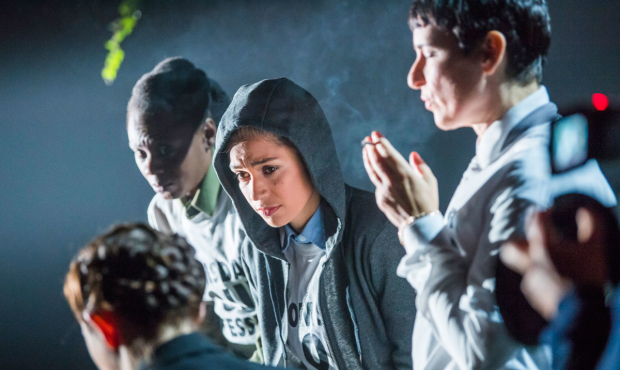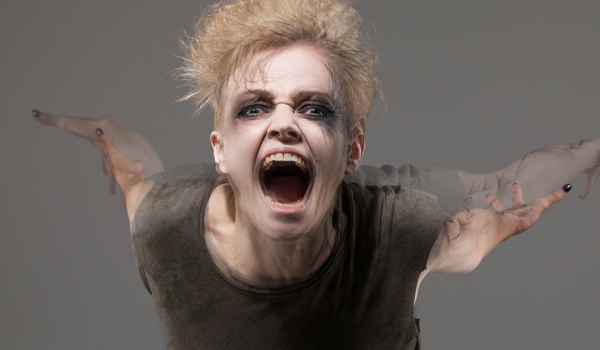Review: What if Women Ruled the World? (Mayfield, Manchester International Festival)

©Tristram Kenton
There's no doubting the ambition or originality of Yael Bartana's discussion-cum-performance, which sets out to do nothing less than answer the question it poses in its title. And produce a campaign for solving the planet's most pressing problems at the same time.
The quality of the brains and talent in this commission by the Manchester International Festival is also impressive. Alongside Bartana, an award-winning Israeli artist, the event is directed by Vicky Featherstone, artistic director of the Royal Court, and part-written by Abi Morgan, of The Iron Lady and Suffragette fame. Yet for all their collective endeavour, the piece remains theatrically inert.
It gathers its audience into the cavernous and imposing spaces of the disused Mayfield rail terminal near Manchester's Piccadilly where we are greeted by a gunmetal doughnut of a conference table and large black and white charts of war (set design Saygel & Schreiber). This is an evocation of the conference room of Stanley Kubrick's Dr Strangelove and the opening scene is a speeded up parody, with women acting as men, of that chilling 1964 movie, with gobbledegook language filling the spaces between chunks of dialogue.
There Strangelove (one of Peter Sellers' most memorable incarnations) proposes the idea that in the post nuclear winter, after the bomb is dropped, there will need to be ten women to every man "and all incredibly attractive". In the sections that follow that idea is reversed: the five actresses are joined by five women experts on world issues (a different group every night) and one tea boy in budgie smugglers. After a short passage in which the actresses imagine the lives of survivors, the event morphs into a conference, where the experts outline the greatest threats to humanity and propose ways in which 'wise citizens' might avert disaster. The entire thing is filmed and will ultimately be an artwork displayed by Bartana.
I hope you're keeping up, but truthfully it was often hard to. And that's not all that's happening. In between the evidence of the hugely impressive experts – on the night I saw it, they included climate change specialist Susan George, virologist Dr Marion Koopmans, the feminist Natasha Walter and Anni-Helena Ruotsala, an advocate for the Sámi people of Finland – there are black and white films charting the movement of the Doomsday Clock towards destruction and written passages where the actresses recount the suffering of women in the world today.
But instead of working together to create a climax, the different strands often pull in opposite directions. For example the actress guzzling cakes and drinking all the water at the table – to symbolise the greed of consumption, presumably – actually distracts from the drama of the expert statements. The tea boy gets a laugh, but is simply silly; the expert women seemed to think that this particular reversal of patriarchy was not to be desired.
In fact, once the real women get talking and the actors settle into their role as chairs of the debate, things improve considerably. What they have to say is fascinating and powerful – and sometimes hugely provocative. The suggestion of Middle East expert Dr Lina Khatib that we should all burn our passports to get rid of borders deserved more discussion than it got. And Susan George's assertion that stopping climate change is "not a question of know-how, it's a question of resources" – and resources currently held by men – got to the nub of the question in the way all the carefully constructed surrounding framework could not.
I suspect the entire event – which you can watch on streamed on BBC this Saturday – will make a very good edited film and a significant piece of art. But as a performance it was frustratingly flawed.
What if Women Ruled the World?] runs at Manchester International Festival until 8 July.











